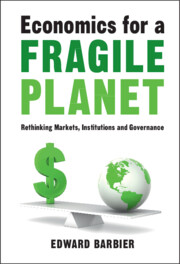3 results
1 - Introduction
-
- Book:
- Economics for a Fragile Planet
- Published online:
- 24 March 2022
- Print publication:
- 31 March 2022, pp 1-20
-
- Chapter
- Export citation
3 - Economics for a Fragile Planet
-
- Book:
- Economics for a Fragile Planet
- Published online:
- 24 March 2022
- Print publication:
- 31 March 2022, pp 55-73
-
- Chapter
- Export citation

Economics for a Fragile Planet
- Rethinking Markets, Institutions and Governance
-
- Published online:
- 24 March 2022
- Print publication:
- 31 March 2022

